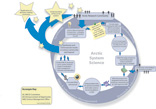ARCSS Program | Community Planning

![]() ARCSS Science Planning Process
(15K -
PDF)
ARCSS Science Planning Process
(15K -
PDF)
Arctic research community
The Arctic is a complex integrated system; thus, successful ARCSS science planning requires participation from a broad and interdisciplinary arctic science community, including physical, natural, and social scientists with a variety of scientific and methodological foci.
Science ideas
and groups of researchers: Emerging Communities of
Practice (Co-oPs)
Communities of Practice (Co-oPs) are groups of researchers organized around a set of arctic system science questions. Co-oPs will work with the ARCSS Committee (AC), the ARCSS Science Management Office (SMO; currently at ARCUS), and the broader research community to develop science questions that align with and advance ARCSS Program goals. Co-oPs could be disciplinary, interdisciplinary, or 'legacy' (e.g. HARC, LAII, etc.) groups. For example, a Co-oP might focus on carbon flux, the impact of rapid change on various sub-systems or, from an ARCSS Program perspective, be similar to the interdisciplinary groups that worked together on SHEBA or GISP2 themes; any group coalescing around an arctic-system relevant science question could be considered a Co-oP.
The Co-oPs and related science ideas may emerge out of such traditional forums as meetings, workshops, or existing groups of collaborators. Co-oPs will not be organized by formal infrastructure, membership, or duties, but will be able to receive a nominal level of support (as funding allows) to facilitate communications, such as teleconferences, website resources, and similar assistance from the ARCSS SMO.
One-page Co-oP concept paper to ARCSS SMO (ongoing)
Emerging Communities of Practice (Co-oPs) will submit a one-page concept paper to the ARCSS Science Management Office (SMO) through an online form. The one-page Co-oP concept paper gives a brief overview of the nature of the Co-oP, the scientific focus, and the types of ARCSS SMO support that would facilitate Co-oP development. Concept papers may be submitted at any time. The online submission form is available through: http://www.arcus.org/arcss/cop.html
Concept paper evaluated by ARCSS SMO and AC and posted on website (ongoing)
The Community of Practice (Co-oP) concept papers are evaluated immediately upon submission through the online form. Providing the form is complete and the scientific focus generally aligns with ARCSS goals, the concept paper is accepted and published to the ARCSS website. At this point, the ARCSS Science Management Office (SMO) and Co-oP will communicate to determine and coordinate SMO support (e.g. web conferences, online bulletin board, etc) to facilitate development of the Co-oP. With ARCSS Committee input, additional Co-oP organizing or community development activities may be recommended.
Co-oP progress and activities assessed and refined by AC, SMO, and Co-oPs (assessed quarterly)
On a quarterly basis, the ARCSS Committee (AC) and Science Management Office (SMO) will assess all existing Communities of Practice (Co-oP) progress and activities. As necessary and with input from the emerging Co-oPs, the AC and the ARCSS SMO will help to focus and refine the science ideas, integrate multiple Co-oPs with similar or complementary interests/science questions, and help to remedy any gaps in community participation.
Five-page prospectuses from Co-oPs elaborating on major science questions (target dates as needed)
The ARCSS Committee will select a set of Communities of Practice (Co-oPs) to submit an approximately 5-page prospectus to the ARCSS Science Management Office. A prospectus will elaborate on the Co-oP science questions - defining how they are relevant to system-scale science, outlining potential approaches and methodologies, and identifying how the science questions build on current knowledge. Target dates (to be announced; first target date in Fall 2005) will be scheduled so that prospectuses contribute to relevant National Science Foundation (NSF) Announcements of Opportunity.
Selected prospectuses integrated and focused by community and AC, with input from NSF
The ARCSS Committee will work with the community, with input from the National Science Foundation (NSF), to assess the prospectuses and focus them to address key arctic system questions in an interdisciplinary, integrated fashion.
Using prospectuses, AC assesses priorities and makes science recommendations to NSF
The ARCSS Committee will use prospectuses, community input, and the ARCSS science plan to assess science priorities and make recommendations to the National Science Foundation (NSF) for desirable Announcements of Opportunity that will promote the development of new research efforts to meet the overarching ARCSS goal of improved arctic system understanding.
Focused Announcement(s) of Opportunity announced
At the discretion of NSF, one or more focused Announcements of Opportunity (AO) may result that incorporates the recommendations of the ARCSS Committee and the Communities of Practice and are open to the entire scientific community.
Funded ARCSS projects
ARCSS proposals are funded and research implemented. From project inception to completion, funded project teams collaborate to provide project coordination, data management, education and outreach efforts, and synthesis.
Synthesize and communicate results to science community and beyond
Findings should be widely communicated to the ARCSS community, the broader scientific community, the public, and stakeholders.
Application to decision-making processes and understanding of the arctic system
The ARCSS Program seeks an integrated arctic system understanding, which is essential to establish a scientific basis for predicting environmental change and—most importantly—for supporting decision-making processes in society and formulating policy options.

